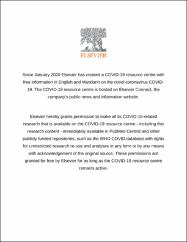| dc.contributor.author | Aydın, Doğan | |
| dc.contributor.author | Karaarslan, Enis | |
| dc.date.accessioned | 2022-04-26T06:35:17Z | |
| dc.date.available | 2022-04-26T06:35:17Z | |
| dc.date.issued | 2021 | en_US |
| dc.identifier.citation | Karaarslan, Enis, and Doğan Aydın. "An artificial intelligence–based decision support and resource management system for COVID-19 pandemic." Data Science for COVID-19. Academic Press, 2021. 25-49. | en_US |
| dc.identifier.isbn | 978-012824536-1 | |
| dc.identifier.uri | https://doi.org/10.1016/B978-0-12-824536-1.00029-0 | |
| dc.identifier.uri | https://hdl.handle.net/20.500.12809/9936 | |
| dc.description.abstract | COVID-19 crisis has shown that the World is not ready for such a rapid spread of a virus resulting in a catastrophic pandemic. Effective use of information technologies is one of the key aspects in reducing the adverse effects of any epidemic or pandemic. Existing management systems have failed to fulfill requirements for curbing the rapid spread of the virus. This chapter firstly describes the current solutions by giving real-world examples. Then, we propose an epidemic management system (EMS) that relies on unimpeded and timely information flow between nations and organizations to ensure resources are distributed effectively. This system will use mobile technology, blockchain, epidemic modeling, and artificial intelligence technologies. We used the Multiplatform Interoperable Scalable Architecture (MPISA) model that allows the integration of multiple platforms and provides a solution for scalability and interoperability problems. Open data repositories and the MiPasa blockchain are also described. These relevant data can be used to predict the potential future spread of the epidemic. Selecting the correct methods for epidemic modeling is discussed as well. Another challenge is deciding on allocating resources where they are most necessary; we propose deploying automated machine learning and stochastic epidemic model-based decision support systems for such purposes. Citizens should not have privacy concerns about the information systems. These trust issues and privacy concerns can be solved by using decentralized identity and zero-knowledge proof-based mechanisms. These mechanisms will ensure that users are in control of their data. In this chapter, we also discuss choosing the right machine learning method, privacy measures, and how the performance challenges can be addressed. This chapter concludes on a discussion of how we can design and deploy better EMSs and possible future studies. | en_US |
| dc.item-language.iso | eng | en_US |
| dc.publisher | Elseiver | en_US |
| dc.relation.isversionof | 10.1016/B978-0-12-824536-1.00029-0 | en_US |
| dc.item-rights | info:eu-repo/semantics/openAccess | en_US |
| dc.subject | Automated machine learning | en_US |
| dc.subject | Blockchain | en_US |
| dc.subject | Contact tracing | en_US |
| dc.subject | Decentralized identity | en_US |
| dc.subject | Decision support system | en_US |
| dc.subject | Epidemic management | en_US |
| dc.subject | Epidemic modeling | en_US |
| dc.title | An Artificial Intelligence Based Decision Support and Resource Management System for COVID-19 Pandemic | en_US |
| dc.item-type | bookPart | en_US |
| dc.contributor.department | MÜ, Mühendislik Fakültesi, Bilgisayar Mühendisliği Bölümü | en_US |
| dc.contributor.authorID | 0000-0002-3595-8783 | en_US |
| dc.contributor.institutionauthor | Karaarslan, Enis | |
| dc.identifier.volume | 1 | en_US |
| dc.identifier.startpage | 25 | en_US |
| dc.identifier.endpage | 50 | en_US |
| dc.relation.journal | Data Science for COVID-19 Volume 1: Computational Perspectives | en_US |
| dc.relation.publicationcategory | Kitap Bölümü - Uluslararası | en_US |


















